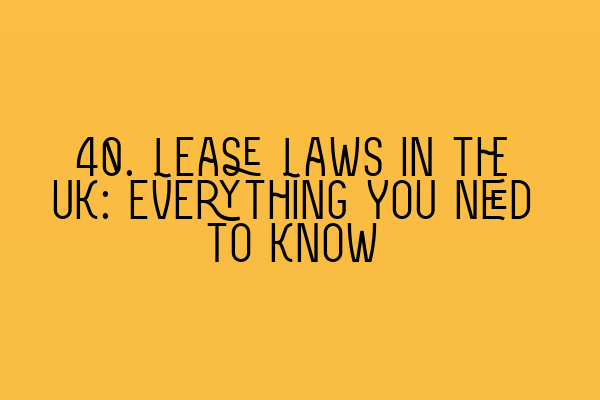Lease Laws in the UK: Everything You Need to Know
When it comes to property ownership and rights, understanding lease laws is crucial. Whether you are a landlord, tenant, or solicitor, having a comprehensive understanding of lease laws in the UK will ensure that you are well-equipped to deal with any legal issues that may arise. In this blog post, we will cover everything you need to know about lease laws in the UK.
1. What is a lease?
A lease is a legally binding contract between a landlord (also known as a lessor) and a tenant (also known as a lessee) that grants the tenant the right to occupy and use a property for a specified period of time. This period is known as the lease term.
To better understand the key terms and provisions of a lease, it is essential to seek professional advice from a qualified property solicitor. SQE Property Law & Land Law offers expert guidance and assistance in lease transactions.
2. Types of Leases
There are various types of leases in the UK, each with its own specific set of rules and regulations. Some common types of leases include:
- Assured Shorthold Tenancy (AST)
- Commercial Lease
- Residential Lease
- Ground Lease
- Short-term Lease
For more details on the different types of leases, you can refer to SQE 1 Practice Mocks FLK1 FLK2.
3. Key Terms in a Lease
Understanding the key terms in a lease is essential to ensure that both parties’ rights and responsibilities are clearly defined. Some important terms to look out for include:
- Lease Term: The duration for which the lease is granted.
- Rent: The amount of money the tenant agrees to pay the landlord in exchange for the use of the property.
- Break Clause: A provision that allows either party to terminate the lease before the end of the lease term.
- Repair and Maintenance: The responsibilities of the landlord and tenant with regards to property maintenance.
- Alterations: Guidelines and restrictions on making changes to the property.
4. Rights and Obligations of Landlords
Landlords have certain rights and obligations under lease laws in the UK. Some key rights and obligations of landlords include:
- Collecting rent from tenants.
- Maintaining the property in a safe and habitable condition.
- Providing tenants with notice before entering the property.
- Complying with health and safety regulations.
- Protecting tenant deposits in a government-approved deposit protection scheme.
For a comprehensive list of landlord obligations, consult with a property solicitor at SQE Property Law & Land Law.
5. Rights and Obligations of Tenants
Tenants also have rights and obligations under lease laws in the UK. Some key rights and obligations of tenants include:
- Living in a property that is safe and free from hazards.
- Paying rent on time and in full.
- Notifying the landlord of any necessary repairs or maintenance.
- Not causing damage to the property beyond normal wear and tear.
- Notifying the landlord of any changes in occupancy.
To learn more about tenant rights and obligations, read our article on SQE 2 Preparation Courses.
6. Terminating a Lease
There are several ways in which a lease can be terminated. These include:
- Expiration of the lease term.
- Mutual agreement between the landlord and tenant to end the lease.
- Violation of lease terms by either party.
- Exercise of a break clause.
If you are facing a situation where you need to terminate a lease, it is advisable to seek legal advice from a property solicitor at SQE Property Law & Land Law.
7. Dispute Resolution
In the event of a dispute between a landlord and a tenant, there are various methods of resolution available, including negotiation, mediation, or litigation. It is important to consult with a property solicitor who specializes in lease laws to ensure that your rights are protected and a favorable resolution is achieved.
For more information on dispute resolution, read our article on SQE 1 Practice Exam Questions.
Conclusion
Lease laws in the UK play a vital role in protecting the rights and interests of both landlords and tenants. Whether you are a landlord or a tenant, having a solid understanding of lease laws will help you navigate through the complexities of lease transactions and resolve any disputes that may arise.
For expert legal advice and assistance with lease matters, contact the professionals at SQE Property Law & Land Law. Our team of experienced solicitors will guide you through the lease process and ensure that your rights are protected.
For more information on lease laws and related topics, explore our SRA SQE Exam Dates.
